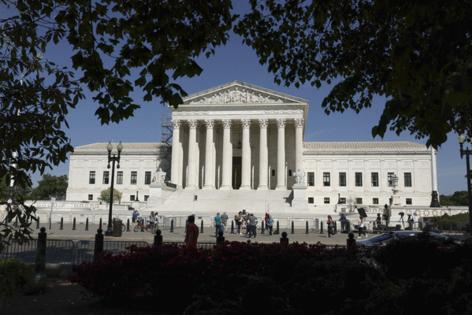Missouri attorney general says government censored social media. The Supreme Court seemed skeptical
Published in Political News
WASHINGTON — Missouri Attorney General Andrew Bailey emerged from the U.S. Supreme Court on Monday, into a biting spring wind and declared that the federal government violated the First Amendment by coercing social media to censor content on their websites.
“We believe that the justices will make the right decision here,” Bailey said, having to shout over drumming and saxophone music from a small protest supporting his argument. “Ultimately we will continue to build a wall of separation between tech and state using this lawsuit.”
Inside the courtroom, six of the nine justices appeared skeptical.
The case, brought by Missouri, Louisiana and five people who said their social media content was either banned or censored, alleges that the federal government violated the first amendment by coercing social media companies into taking down content related to COVID-19 health restrictions and the 2020 presidential election.
The court’s decision could have sweeping implications for how the federal government communicates with social media companies — from the FBI raising concerns about harmful posts to how the White House can interact with potentially harmful viral social media trends.
Since it was brought in May 2022, the case has unveiled hundreds of thousands of emails between the federal government and social media companies. But several of the justices appeared skeptical that their contents were different than how the federal government treats the print media — prompting a few dry jokes about whether they’d ever expressed their own harsh opinions about articles directly to reporters.
The court’s three liberal justices, along with Chief Justice John Roberts and Justices Brett Kavanaugh and Amy Coney Barrett, appeared focused on where to draw the line between the government coercing the social media companies and whether it was using the so-called “bully pulpit” to try to influence the actions of a private company.
Benjamin Aguiñaga, the solicitor general of Louisiana, called himself a “First Amendment purist” and appeared to take the position that most communication between the federal government and social media companies crossed the line, because it was asking the companies to remove the speech of third parties — people who wouldn’t be able to have a direct say.
His view is one that has become increasingly popular in Republican politics — one in which the content moderation policies of social media companies is used to suppress conservative voices. But his argument hit a wall with some justices who were concerned that it would mean the FBI can’t share information with social media companies about potential security threats.
After Barrett asked a hypothetical question about the FBI warning social media sites about posts calling on people to do harm to a specific individual, she appeared surprised that Aguiñaga suggested that it shouldn’t be allowed.
...continued
©2024 The Kansas City Star. Visit at kansascity.com. Distributed by Tribune Content Agency, LLC.







Comments